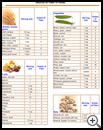
Diet for Irritable Bowel Syndrome
________________________________________________________________________
KEY POINTS
- Irritable bowel syndrome (IBS) is a disorder in which your large intestine does not always work normally. IBS causes constipation, diarrhea, or both, and cramping or pain in the belly that comes and goes.
- Many people find that high-fat foods, fried foods, caffeine, and alcohol cause symptoms.
- If you think a certain food causes problems for you, try cutting it out of your diet for 12 weeks. If your symptoms improve, you will know to avoid that food. If there's no change, you can go back to eating that food.
- It may also help to eat smaller meals more often, and to avoid stress during and after you eat.
________________________________________________________________________
What is irritable bowel syndrome?
Irritable bowel syndrome (IBS) is a disorder in which your large intestine does not always work normally. The large intestine is also called the colon or large bowel. The nerves in your intestines may make the muscles squeeze too much when you eat. This can make food move too fast through your intestines, causing gas, bloating, cramping, and diarrhea. In other cases, the muscles may not squeeze enough, which slows the passage of food and causes cramps and constipation.
Although IBS can cause cramping, gas, constipation, or diarrhea, it does not damage your intestines and does not lead to life-threatening illness.
IBS is the most common intestinal disorder. It affects more women than men and usually starts in early adulthood. Sometimes it is called spastic colon.
What diet helps IBS?
There is no one best diet for everyone with IBS. Your symptoms may be brought on by certain foods, while someone else with IBS can eat those foods without having problems. High-fat foods, fried foods, caffeine, and alcohol may cause stomach cramps and diarrhea.
If you think a certain food causes problems for you, try cutting it out of your diet for 12 weeks. If your symptoms improve, you will know to avoid that food. If there's no change, you can go back to eating that food, and try cutting out a different food. Work with your healthcare provider to find the best diet for you.
There is some research that shows that limiting short-chain carbohydrate foods (FODMAP) may help decrease gas, stomach pain, bloating, and other symptoms. It’s best to work with a dietician if you want to try the low FODMAP diet, but in general, it involves limiting foods such as:
- Beans such as baked beans, chickpeas, lentils, and kidney beans
- Dairy products such as regular and low-fat milk, ice cream, cheeses, and yogurt
- Fruits and fruit juices such as apple, apricot, avocado, cherry, mango, nectarine, peach, pear, plum, prunes and other dried fruits, and watermelon
- Rye and wheat bread, bagels, crackers, and pasta in large amounts
- Sweeteners such as fructose, high-fructose corn syrup, maltitol, mannitol, sorbitol, xylitol, and other sweeteners ending in “-ol”. These are found in many foods, including candy and gum
- Vegetables such as artichoke, asparagus, beetroot, broccoli, Brussels sprouts, cabbage, cauliflower, garlic, leek, mushrooms, okra, onions, and peas
Dietary fiber is the part of plants that cannot be digested. There are 2 kinds of dietary fiber:
- Insoluble fiber adds bulk to keep foods moving through your digestive system.
- Soluble fiber holds water that helps soften the stool for easy bowel movements.
If you do not have enough fiber in your diet, you may have constipation. However, high-fiber foods may increase gas and bloating. If you have constipation even though you have added high-fiber foods to your diet, make sure you are drinking enough liquid. Talk to your healthcare provider about fiber laxatives. Your provider may recommend a certain kind laxative for your symptoms.
Besides food choices, some tips that may help include:
- Keep a food record during flare-ups to help you figure out what foods or eating behaviors are causing problems.
- Instead of 2 or 3 large meals, try eating smaller meals, more often.
- Allow enough time for eating so you can chew your food carefully and not feel rushed. Try to avoid stressful situations before or during meals.
- Avoid eating large meals or meals with lots of spicy or fatty food.
- If you are constipated, eat breakfast. The first meal of the day may help stimulate your digestive system so that you can have a bowel movement.
- Ask your healthcare provider if you should avoid aspirin and other nonsteroidal anti-inflammatory drugs (NSAIDs), such as ibuprofen, or naproxen. They may cause stomach bleeding and other problems.

